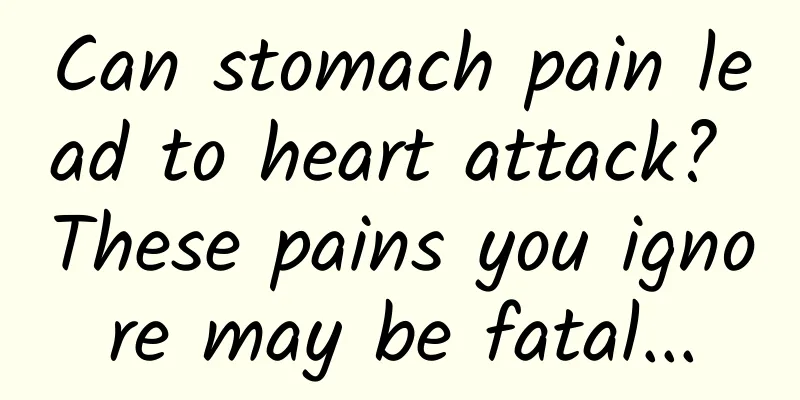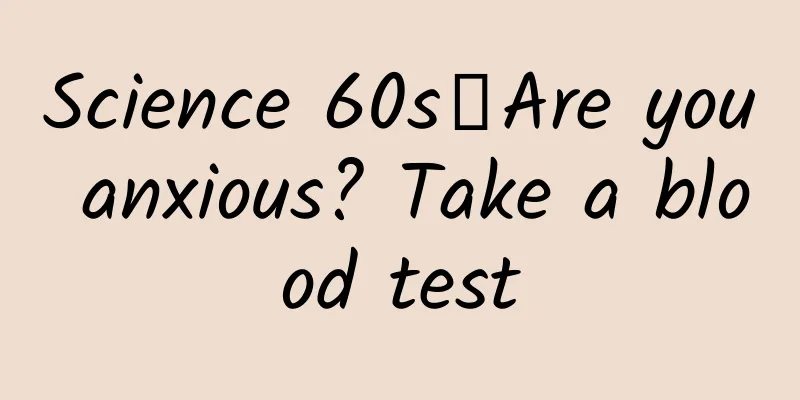Can stomach pain lead to heart attack? These pains you ignore may be fatal...

|
Expert of this article: Yan Kaixin, Master of Cardiovascular Medicine, PLA General Hospital This article was reviewed by Zhang Mingzhi, a postdoctoral fellow at the Fuwai Hospital of the Chinese Academy of Medical Sciences When it comes to myocardial infarction, many people's first reaction is chest pain. As one of the typical symptoms of myocardial infarction, it is being taken seriously by more and more people. Recently, a 23-year-old young man from Ningbo, Zhejiang was sent to the emergency center because of stomach pain, but it was too late and he had no vital signs. His family was heartbroken and could not imagine that their son, who usually had good physical fitness, was gone. Weibo screenshot The doctor learned from the patient's family that the patient had symptoms of stomach pain and asthma before his death. Combined with the troponin test, it was determined that the patient died of atypical myocardial infarction, and the medicine he took for stomach pain before his death had no effect at all in alleviating the symptoms. News screenshots In April last year, 52-year-old Mr. Li had a sore throat for half a month, but he didn't pay attention to it. He went to the hospital for treatment only when his condition worsened. After examination by the doctor, he was diagnosed with acute myocardial infarction. Fortunately, he received timely treatment and no major disaster occurred. It turns out that the symptoms of myocardial infarction are not just chest pain. Pain in other parts of the body may also indicate the occurrence of myocardial infarction. Today, I will take you to learn more about it. What is a myocardial infarction? The blood supply to the heart comes from the coronary arteries. When the blood supply to the coronary arteries is suddenly reduced or interrupted, the blood supply to the heart will be interrupted, causing myocardial ischemia and hypoxia. Long-term and severe ischemia and hypoxia can cause myocardial necrosis, commonly known as myocardial infarction. Myocardial infarction can be divided into typical myocardial infarction and atypical myocardial infarction according to symptoms. Typical myocardial infarction has the well-known symptoms: sudden onset of persistent and severe squeezing and stabbing pain behind the sternum (the pain is generally located behind the sternum or precordial area and may radiate to the shoulder), accompanied by nausea, irritability, sweating, a sense of impending death, etc. Atypical myocardial infarction is called "atypical myocardial infarction" because the symptoms are unrelated to the heart and the clinical manifestations are atypical, which makes it easy for people to ignore the disease warning signals sent by the heart. The most prominent feature is that the location of the pain is atypical. It may be sore throat, gum pain, tinnitus, neck pain, left shoulder and neck pain, stomach pain, abdominal pain, etc. The location of the pain varies from person to person and there is no specific location. Therefore, it is very easy for patients to have the illusion that "I feel that it is not a big deal and it will be fine after a while", thereby misleading the public. What are the symptoms of atypical myocardial infarction? Because the symptoms are atypical, atypical myocardial infarction has no specific symptoms. Generally speaking, most of the radiating pain from the heart will affect the left half of the body, such as the head, shoulders, neck, upper and lower limbs. Sometimes sore throat, stomach pain, and abdominal pain also require extra attention. The atypical manifestations of atypical myocardial infarction can be summarized as follows: Sore throat Patients may mistake sore throats without obvious causes for symptoms caused by a "cold," so they are rarely associated with myocardial infarction. If sore throats are accompanied by chest tightness, shortness of breath, and palpitations after normal activities, you need to be extra vigilant. Toothache Clinically, toothache caused by cardiac disease is called "cardiogenic toothache". Its characteristics are: The location of toothache is not specific to a particular tooth; No diseased teeth can be detected; Cannot be relieved by pain medication; There are often triggers before an attack, such as strenuous activity, fullness, and emotional excitement. Pain and numbness in the limbs Ischemia often causes pain and numbness in the limbs. Numbness may occur when you are resting, exercising, or angry, or at night without any warning. The pain and numbness are widespread and often tend to be on the left side, which can manifest as pain in the shoulders and arms, or numbness in the feet. Numbness in the hands and feet is related to nerve control, especially numbness in the left shoulder, inner side of the left upper arm, and left hand. Gastrointestinal symptoms Nausea and vomiting, acid reflux, belching, loss of appetite, stomach pain, and abdominal pain may all be precursors to atypical myocardial infarction, known as "radiating pain." It may occur after activities or when you are emotionally excited. Patients are often healthy and do not take these symptoms seriously, resulting in missing the best time for treatment. How to prevent heart attack? There are many causes of myocardial infarction, and good health management can greatly reduce the risk of disease. Regular physical examinations: Arrange a comprehensive physical examination every year. If you find any problems, seek medical attention in time to strive for early detection, early treatment, and early recovery. Regular life schedule: It is recommended to go to bed early and get up early. If you can't do that, it is also OK to go to bed late and get up late. As long as you have enough and regular sleep time, it can be called "regular life schedule". Stick to a healthy diet: Don’t eat big fish and meat every day. The stomach and intestines also need rest. Use light side dishes to “relieve the pressure” on the stomach and intestines. Avoid emotional excitement: Especially patients with cardiovascular diseases should avoid emotional ups and downs, which can easily induce the occurrence and development of the disease. Exercise every day: improve your cardiopulmonary function, improve your mood, and relieve stress. Elderly people should not exert excessive force when defecating: especially elderly people with high blood pressure. When they exert excessive force when defecating, the intra-abdominal pressure of the human body increases and the blood pressure rises rapidly. In severe cases, the blood pressure may be twice as high as usual and the heart rate will also increase. These will increase the burden on the heart and may induce myocardial infarction. Pay special attention when bathing: Do not bathe when you are hungry or full. The water temperature should be equal to body temperature, and it is not good to be too hot. Bathing time should not be too long, otherwise it is easy to lack of oxygen. The pictures in this article with the "Science Popularization China" watermark are all from the copyright gallery. The pictures are not authorized for reprinting. |
<<: How do visually impaired athletes shoot and ski?
>>: Understanding Russian History in One Breath (2)
Recommend
The 4 growth logics of brand marketing
The 2021 Central Economic Work Conference held in...
Operation Case | 25 perfect details, Apple after-sales service teaches us how to operate
We often come across many excellent operation cas...
Who is using Win10 like this?
As an important part of Windows 10's multi-sc...
Great Wall Motor's net profit fell sharply by 75.6% in the first half of the year, and the new energy transformation encountered great difficulties
In the first half of 2023, Great Wall Motor's...
Tik Tok Promotion: The Secret of Tik Tok’s Recommendation Algorithm!
Algorithms are an indispensable evaluation mechan...
How can businesses use short video platforms for marketing in 2021?
A summary of how businesses and companies can use...
Commercialization and monetization guide: How to improve the eCPM of information flow advertising?
Information flow advertising is almost a must for...
What should I do if I have no experience and no one to guide me?
Some classmates left me a message asking, "I...
PagerAdapter paging image and text view, can slide left and right
Source code introduction I have been studying abo...
Wearing a helmet and riding a battery bike, will you be fined? The traffic police will tell you why →
We all know that you need to wear a helmet when r...
New energy vehicle production capacity is overheated, 10 times the sales volume
New car-making forces have entered the mass produ...
Pan Yi_Required Course of Chinese Medicine Culture
Resource Introduction: Pan Yi: Compulsory Course ...
Liu Yiwei's "Corporate Commander" Baidu Cloud Download
Liu Yiwei's "Corporate Commander" R...
Learn these 7 techniques, and even beginners can play Douyin in minutes
Recently, I often see complaints about Douyin in ...
Introduction to Qinggua Media’s intelligent advertising delivery system!
Introduction to Qinggua Media Intelligent Adverti...

![[Grain Policy of a Great Country] Deep Sea Aquaculture 2.0: Using Technology to Unlock the "New Copy" of the Blue Granary](/upload/images/67f1c98da4db7.webp)







